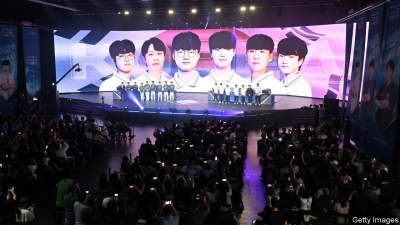The Economist-E-sports could revitalise international sports events Culture
September 22, 2023 4 min 714 words
这篇报道讨论了电子竞技对国际体育赛事的潜在影响和重要性。报道指出,奥运会的观众年龄逐渐上升,观众数量下降,因此国际奥委会需要采取措施来保持与社会的联系和吸引更多观众。作者提出,电子竞技是一个巨大的潜在市场,预计到2025年,将有约3.2亿电竞粉丝每月观看比赛。电竞的巅峰观众人数甚至已经超过了一年一度的超级碗比赛。 然而,国际奥委会迄今为止对电子竞技持保守态度,试图引入一些电竞项目,但遭到了质疑和嘲笑。文章建议,国际奥委会可以从亚洲运动会的经验中汲取教训,亚洲运动会将首次举办电子竞技项目,这将使更多的国家和地区有机会参与奥运会,同时也能够增加媒体和赞助收入。 文章还提到,电子竞技运动员表现出卓越、友谊和尊重等奥林匹克价值观,因此电子竞技完全可以与奥运会的核心价值观相契合。总之,报道强调了电子竞技对国际体育赛事的潜在积极影响,同时呼吁国际奥委会更加开放地接纳这一领域。
THE OLYMPIC GAMES are old—the first modern edition was held in Athens in 1896—and so are the fans. The median age of American viewers of the games in Barcelona in 1992 was 39. That increased to 53 for the Rio de Janeiro games of 2016. Overall viewing figures are sinking, too. At the most recent games in Tokyo in 2021, delayed from 2020, they were a third lower than in 2008.
Thomas Bach, the president of the International Olympic Committee (IOC), has acknowledged that the games risk losing relevance. “We have to keep connected” with society, he said in 2020. To do so, the Olympics are expanding, adding what Mr Bach described as “youth-based” sports. In Tokyo, climbing, skateboarding and surfing were put on the schedule. In Paris next year, breakdancing will feature for the first time. Undoubtedly the youth will be thrilled. But if Mr Bach wants the Olympics to become more relevant to more people, the best idea would be to include e-sports, or competitive video games.
E-sports command a huge audience. By 2025, around 320m fans are expected to be watching at least once a month, reckons Newzoo, a data firm. In 2021 peak viewership for the World Championship final of League of Legends, a fantasy strategy game, was nearly 74m people, according to Riot Games, the game’s publishers. The peak figure for the Super Bowl, the highlight of the American football year, was 115m.
So far the IOC has approached e-sports like an uncool dad. An inaugural Olympic E-sports Week took place in Singapore in June. But the choice of events puzzled fans. The archery game, for instance, had been downloaded only 100 times before the tournament was announced. The most recognisable event, “Just Dance”, a motion-sensing dance simulator, is not considered an e-sport by aficionados. The experiment resulted in widespread mockery and multiple memes. Few people took the competition seriously. Peak viewership was barely more than 22,000.
The IOC should take its cue from the four-yearly Asian Games, which start in the Chinese city of Hangzhou on September 23rd. With 12,400 athletes, the competition will have more participants than the Tokyo Olympics. It will also be the first event of its size to feature e-sports. In addition to athletes participating in traditional sports, gamers from across Asia will compete in seven events, including hugely popular games such as FIFA Online 4, a football game, and League of Legends, which has more than 180m players. Organisers of the next Asian Games, in Japan, have confirmed they will also award medals for e-sports.
Capturing a big audience matters for events like the Olympics, which have seen the costs of infrastructure and security balloon in recent years. The inclusion of e-sports would boost revenues from media rights and sponsorship. The industry was valued at $1.4bn last year, a figure that is expected to triple by 2030, according to Cognitive Market Research, a consulting firm.
Yet the IOC remains hesitant about embracing the gaming world. It has claimed that mainstream video games do not align with Olympic values. One reason is the perceived association of e-sports with violence. Mr Bach has said that for the Olympics there is “an absolute taboo” regarding “killer games”, such as League of Legends. The Olympics may well encompass shooting, fencing and boxing, but according to Mr Bach these are a “civilised expression” of real fighting, unlike blasting a bunch of pixels on a screen. (There is, however, little evidence to suggest that violence in e-sports spills over into real life.)
Beyond the potential financial boost, the IOC has other reasons for changing its stance. For one, e-sports may bring Olympic glory to a more diverse group of countries. At the Asian Games, Vietnam and Indonesia, middleweights in mainstream sports, are among the favourites.
And as for Olympic values? At a tournament in February 2022, just after Russia invaded Ukraine, Oleksandr Kostyliev, a Ukrainian gamer, spoke warmly of his team-mates, three Russians and one Ukrainian, whom he called “my real friends”. Team Spirit, another team containing Ukrainian and Russian gamers, responded to the invasion by releasing a statement saying, “We are against war and we are against violence.” Excellence, friendship and respect are the three Olympic values. E-sports stars manifest them pretty well. ■

